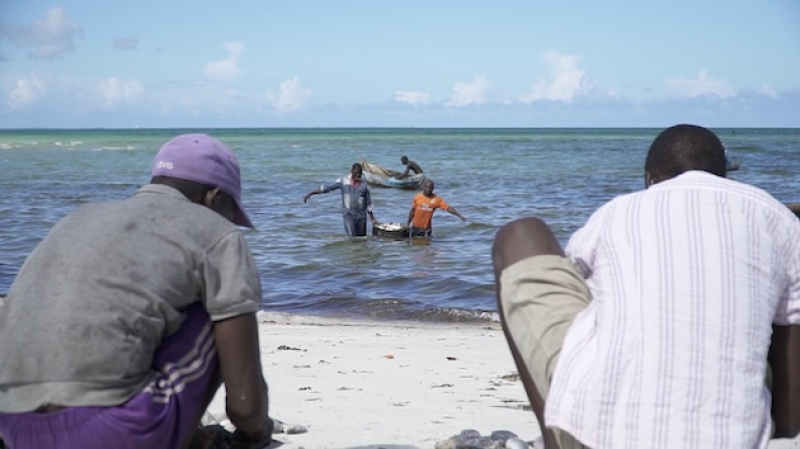- Arab-Islamic summit over Israeli strike on Doha Monday |
- NASA Rover Uncovers Strongest Hint of Ancient Life on Mars |
- Eminent Lalon singer Farida Parveen passes away |
- Dr Yunus mourns Farida Parveen's death |
- From DUCSU to JUCSU, Shibir Extends Its Winning Streak |
Environmentalists Challenge US $5B Loan for Mozambique LNG

Fishermen in the LNG rich Afungi Peninsula in the Palma District of Cabo Delgado Province, northern Mozambique. The area is the site of major LNG projects, including the Mozambique LNG project.
Environmental campaign groups are confident that a suit filed in the United States, seeking to stop the Export-Import Bank (EXIM) from the “unlawful” lending of nearly USD 5 billion to the controversial Mozambique Liquefied Natural Gas (LNG) project, will succeed.
The groups, including Friends of the Earth U.S. and Justiça Ambiental/Friends of the Earth Mozambique, with representation from EarthRights International, filed a lawsuit alleging that the March financial transaction with project owners TotalEnergies was rushed to avoid requisite procedures.
They claim EXIM approved the deal without conducting required “environmental reviews, economic assessments, and public and congressional input.”
“EXIM failed to follow its own Charter and federal law, setting a dangerous precedent for future decisions,” they said in papers filed on 14 July.
The suit alleges that in February, President Donald Trump “illegally” constituted EXIM’s acting Board of Directors without Senate consent, and weeks later, in March, the board announced final approval of the USD 4.7 billion loan.
The bank, they charged, proceeded despite the ongoing conflict and humanitarian crisis in Mozambique, and the fact that TotalEnergies declared force majeure over four years ago after a violent uprising, preventing operations from resuming.
“EXIM’s Board charged ahead with subsidizing the project without considering the conflict or the environmental and social harms, despite multiple nations’ investigations into serious human rights violations,” they added.
An EXIM spokesperson declined to comment on ongoing legal proceedings.
According to Hallie Templeton, Legal Director of Friends of the Earth, EXIM is bound by federal laws, including the Export-Import Bank Act, which governs its actions and financing.
“The US Congress placed numerous limitations and procedural protections on EXIM’s activities, given the sensitive foreign policy, economic, and human rights issues that lending to foreign projects entails,” Templeton said.
“Among other things, this includes notice and comment procedures, economic considerations to protect the US economy, quorum requirements for Senate-approved board members, and assessment of environmental and social impacts,” he added.
Templeton said the acting board lacked legal authority to approve the loan, and EXIM failed to follow mandated procedures under the National Environmental Policy Act and the Administrative Procedure Act.
“Rushing through the loan without notice, comment, or compliance with legal requirements was unlawful. EXIM should have taken these steps in any scenario,” he emphasized.
The bank’s disregard of the law is compounded by ongoing conflict, allegations of grave human rights violations, and pending investigations related to project security and operations.
Friends of the Earth-US expressed confidence in the case’s success, noting that EXIM violated multiple federal laws, acting contrary to its Charter.
Through the Freedom of Information Act, it was revealed that EXIM ignored Mozambique LNG’s risks when approving the project in 2019/2020 and continued to do so in 2025.
“EXIM did not allow Congress or the public adequate time to comment because they knew this was a bad deal for American taxpayers,” said Kate DeAngelis, Economic Policy Deputy Director for Friends of the Earth US.
“Exim’s Board’s illegal decision to subsidize this project without considering risks to local people or allegations of a massacre at the site is beyond reckless. EXIM must consider the harms inflicted on local communities,” said Richard Herz of EarthRights International.
An Islamist insurgency in Cabo Delgado province since 2017 has caused thousands of deaths and displacement, making it one of Africa’s bloodiest recent conflicts. While Jihadist violence has lessened after regional intervention, attacks continue, highlighting ongoing insecurity.
TotalEnergies suspended operations in April 2021 due to escalating attacks, halting construction and personnel deployment.
Last December, Japanese climate and environmental activists criticized the Japan Bank for International Cooperation (JBIC) for financing the project with a USD 3 billion loan in July 2024, plus USD 536 million to Mitsui, a Japanese corporate developer.
“The Mozambique LNG Project is linked to violent conflict, social injustices among Mozambicans, and potential massive carbon emissions,” the report noted.
It concluded that if the project proceeds, despite being Africa’s largest gas project, it would deliver low revenues to Mozambique and expose the country to liability if it fails.

